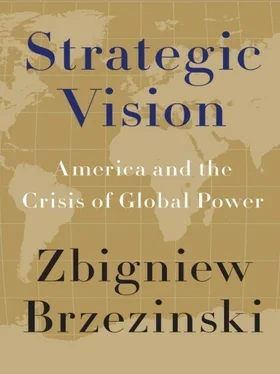Zbigniew Brzezinski - Strategic Vision - America and the Crisis of Global Power
Здесь есть возможность читать онлайн «Zbigniew Brzezinski - Strategic Vision - America and the Crisis of Global Power» весь текст электронной книги совершенно бесплатно (целиком полную версию без сокращений). В некоторых случаях можно слушать аудио, скачать через торрент в формате fb2 и присутствует краткое содержание. Город: New York, Год выпуска: 2012, ISBN: 2012, Издательство: Basic Books, Жанр: Публицистика, на английском языке. Описание произведения, (предисловие) а так же отзывы посетителей доступны на портале библиотеки ЛибКат.
- Название:Strategic Vision: America and the Crisis of Global Power
- Автор:
- Издательство:Basic Books
- Жанр:
- Год:2012
- Город:New York
- ISBN:9780465029556
- Рейтинг книги:4 / 5. Голосов: 1
-
Избранное:Добавить в избранное
- Отзывы:
-
Ваша оценка:
- 80
- 1
- 2
- 3
- 4
- 5
Strategic Vision: America and the Crisis of Global Power: краткое содержание, описание и аннотация
Предлагаем к чтению аннотацию, описание, краткое содержание или предисловие (зависит от того, что написал сам автор книги «Strategic Vision: America and the Crisis of Global Power»). Если вы не нашли необходимую информацию о книге — напишите в комментариях, мы постараемся отыскать её.
Strategic Vision: America and the Crisis of Global Power — читать онлайн бесплатно полную книгу (весь текст) целиком
Ниже представлен текст книги, разбитый по страницам. Система сохранения места последней прочитанной страницы, позволяет с удобством читать онлайн бесплатно книгу «Strategic Vision: America and the Crisis of Global Power», без необходимости каждый раз заново искать на чём Вы остановились. Поставьте закладку, и сможете в любой момент перейти на страницу, на которой закончили чтение.
Интервал:
Закладка:
The younger generation of today is particularly responsive to political awakening because the Internet and cellular phones liberate these young adults from their often-confining local political reality. They are also the political mass most inclined to militancy. In much of today’s world, the millions of university students are thus the equivalent of Marx’s concept of the “proletariat”: the restless, resentful postpeasant workers of the early industrial age, susceptible to ideological agitation and revolutionary mobilization. Political sloganeering through the mass media can translate their often-inchoate sentiments into simple and focused formulations and action prescriptions. The more the latter can be related to specific resentments and deeply felt emotions, the more politically mobilizing they become. Not surprisingly, discourses about democracy, rule of law, or religious tolerance resonate less. In some cases, Manichean visions—rooted in reactions to subjectively felt racial, ethnic, or religious humiliations—have a more powerful appeal, such as in Iran in 1979. They explain better what the young feel while legitimating their thirst for retribution and even revenge.
The popular uprisings in North Africa and the Middle East during the first few months of 2011 provide a particularly vivid example of the potential consequences of the accelerating political awakening, characterized by the convergence of disaffected youth bulges with increasingly accessible mass communication technology. They were driven by resentment against corrupt and unresponsive national leaderships. Local frustrations with unemployment, political disfranchisement, and prolonged periods of “emergency” laws provided the immediate motivating impulse. Leaders who had been secure in their rule for decades found themselves suddenly confronted by the political awakening that had been gestating in the Middle East since the end of the imperial era. The interaction between the disenfranchised but politically aroused youth populations of the Middle East and the revolution in communication technology is now an important reality of geopolitics in this century.
In its very early phases, political awakening tends to be most impatient and prone to violence. Its passion is fueled by a deep sense of historically aggrieved self-righteousness. In addition, early political awakening is characterized by a focus on national, ethnic, and religious identity—especially identity defined by opposition to a detested external force rather than by abstract political concepts. Thus, populist nationalisms in Europe were initially ignited by opposition to Napoleon’s conquests. Japanese political stirrings in the late Tokugawa period of the nineteenth century first took the form of antiforeign agitation and then turned by the first half of the twentieth century into an expansionist and militaristic nationalism. Chinese opposition to imperial domination surfaced violently in the Boxer Rebellion at the turn of the twentieth century and gradually led to a nationalistic revolution and civil wars.
In today’s postcolonial world, the newly politically awakened partake of a common historical narrative that interprets their relative deprivation, prolonged external domination, denial of self-dignity, and continued personal disadvantage as the collective legacy of Western domination. Its anticolonial sharp edge is aimed at the West, fed by still vivid memories of British, French, Portuguese, Spanish, Belgian, Dutch, Italian, and German colonialism. In Muslim countries of the Middle East, even despite the fascination of many young Muslims with American mass culture, the intense resentment against American military intrusion in the Middle East as well as its support of Israel is now seen also as an extension of Western imperialism and thus as a major source of their felt deprivation. {1} 1 In a Pew 2010 survey, the percentage of respondents who held a favorable view of the United States was 17% in Turkey, 17% in Egypt, 21% in Jordan, 52% in Lebanon, and 17% in Pakistan. In that same survey, the percentage of respondents who believed that the United States considers their country’s interests when making foreign policy either a “great deal” or “a fair amount” was 9% in Turkey, 15% in Egypt, 26% in Jordan, 19% in Lebanon, and 22% in Pakistan. In a Pew 2008 survey, the percentage of respondents who associated selfishness with people in Western countries was 81% in Indonesia, 73% in Jordan, 69% in Turkey, 67% among British Muslims, 63% in Egypt, 57% among German Muslims, 56% in Nigeria, 54% in Pakistan, 51% among French Muslims, and 50% among Spanish Muslims. In that same survey, the percentage of respondents who associated arrogance with people in Western countries was 74% in Nigeria, 72% in Indonesia, 67% in Turkey, 64% among British Muslims, 53% in Pakistan, 49% in Egypt, 48% in Jordan, 48% among German Muslims, 45% among French Muslims, and 43% among Spanish Muslims.
A prescient analysis of this phenomenon concluded, shortly after the end of the Cold War, that “one common and fundamental ingredient in cultural non-Westernisms today is a profound resentment against the West,” [3] Donald J. Puchala, “The History of the Future of International Relations,”Ethics and International Relations 8 (1994): 197.
citing as an evocative example the poem “Vultures” by the Senegalese poet, David Diop:
In those days,
When civilization kicked us in the face
When holy water slapped our cringing brows
The vultures built in the shadow of their talons
The blood stained monument of tutelage . . .
The poem encapsulated the anti-imperialist sentiment of a significant part of the new intelligentsia in the postcolonial regions. If such hostile views of the West were to become the universal mindset of the politically activated populations of the emerging countries, the more benign democratic values that the West was so hopefully propagating at the outset of the twenty-first century could become historically irrelevant.
Two further and indirect consequences of the phenomenon of global political awakening are also noteworthy. The first is that it marks the end of relatively inexpensive and one-sided military campaigns by technologically superior expeditionary forces of the West against politically passive, poorly armed, and rarely united native populations. During the nineteenth century native fighters in head-on battles against the British in Central Africa, against the Russians in the Caucasus, or against the Americans by Indians typically suffered casualties at a ratio of 100:1 in comparison to their well-organized and much better armed opponents. In contrast, the dawn of political awakening has stimulated a wider sense of shared commitment, greatly increasing the costs of external domination, as demonstrated in recent years by the highly motivated, much more persistent, and tactically unconventional popular resistance (“the people’s war”) of the Vietnamese, Algerians, Chechens, and Afghans against foreign domination. In the resulting battles of will and of endurance, the technologically more advanced were not necessarily the winners.
Second, the pervasive spread of political awakening has given special importance to a previously absent dimension of competitive world politics: global systemic rivalry. Prior to the onset of the industrial age, military prowess (weaponry, organization, motivation, training, and strategic leadership), backed by an adequate treasury, was the central and determining asset in the quest for a dominant status, with the issue often resolved by just one decisive land or sea battle.
In our time, comparative societal performance, as popularly judged, has become a significant component of national influence. Before 1800, no attention was paid to comparative social statistics—nor were they readily available—in the rivalries of France vs. Great Britain, or Austria-Hungary vs. the Ottoman Empire, not to mention China vs. Japan. But in the course of less than a century, societal comparisons have become increasingly important in shaping competitive international standings in public approval, especially for the top protagonists such as the United States and the USSR during the Cold War, or currently the United States and China. Discriminating awareness of varying social conditions is now commonplace. Rapid and extensive access to international news and information, availability of numerous social and economic indexes, growing interactions between geographically distant economies and stock exchanges, and widespread reliance on television and the Internet all produce a continuous flow of comparative assessments of the actual performance and future promise of all major social systems. The systemic rivalry among major contenders is now scrutinized continuously, and its future outcome is currently seen by the world at large as especially dependent on the relative performance—carefully measured and projected even decades ahead—of the economies and social systems of America and China respectively.
Читать дальшеИнтервал:
Закладка:
Похожие книги на «Strategic Vision: America and the Crisis of Global Power»
Представляем Вашему вниманию похожие книги на «Strategic Vision: America and the Crisis of Global Power» списком для выбора. Мы отобрали схожую по названию и смыслу литературу в надежде предоставить читателям больше вариантов отыскать новые, интересные, ещё непрочитанные произведения.
Обсуждение, отзывы о книге «Strategic Vision: America and the Crisis of Global Power» и просто собственные мнения читателей. Оставьте ваши комментарии, напишите, что Вы думаете о произведении, его смысле или главных героях. Укажите что конкретно понравилось, а что нет, и почему Вы так считаете.











